Unit5 Topic1 Section C课堂作业
仁爱英语七年级下册Unit5 Topic1 SectionC 随堂练习

Unit5 Topic1 SectionC 随堂练习一、用方框中所给词的适当形式填空。
1. Many books are in the ______. I often borrow them there after class.2. —How often does Miss Li go shopping?—______ a week.3. It’s 9:00 p. m. It’s time to go to ______.4. Fourteen days are two ______.5. Lunch ______ at eleven thirty. Let’s go now.二、单项选择1. ____ do you watch TV?—Three times a week.A. How longB. How oftenC. How many timesD. How much2. The woman ____ takes the subway home.A. some timeB. some timesC. sometimesD. sometime3. He can’t speak French, so he ____ speaks French.A. seldomB. oftenC. sometimesD. never4. —What does Jane do after school?—She often ____.A. plays the basketballB. plays basketballC. plays the guitarD. plays guitar5. —Do you often _______ after dinner?—Yes, I do.A. see a movieB. look at TVC. play computer gameD. read book三、用所给单词的适当形式填空Xiao Min usually gets up at seven o’clock. He has breakfast at half past seven and then 1 to school. Classes 2 at eight o’clock in the morning and finish (结束)at threeo'clock in the afternoon. 3 school, Xiao Min usually plays games with his classmates. At about half past six, he has dinner with his family. Then he 4 TV for a short time. In the evening he reads books or 5 to music. He goes to bed at half past nine.1. ____2. ____3. ____4. ____5. ____四、根据汉语提示完成句子。
Unit 5 Topic 1 Section A 课堂练习题2022-2023学年七年级下册

七下(仁爱版)Unit 5 Topic 1 Section A 课堂练习题Class_________Name_________ Number________一、单词过关自行车_______ 公交车_______ 小轿车_________ 火车__________飞机__________ 轮船__________ 小船__________ 地铁_________脚___________二、写出下列动词的三单形式:A. come _______ look_______ work_______ live _______B. guess_______ teach_______ dress_______ watch______ catch_______C. try _______ study _______ carry_______ fly _______D. go _______do _______have_______ be _______三、根据句意和首字母提示填写单词1. My mother o_________ goes to work by bus.2. They a_________ play games after school.3. They are brothers, they look the s__________.4. It’s a long way, you must go there by t____________.四、根据句意及汉语提示完成句子1. —Have a good weekend!—______ ______ ______ (对……也一样)you!2. Ren Han often comes to school ______ ______ (步行).3. Does your father go to work ______ ______ (乘火车)?4. They ______ (总是,一直)go to Beijing by plane.5. ______ ______ (快点)!We don’t have much time.6. 我通常步行上班。
仁爱版英语七年级下册Unit5Topic1测试卷及参考答案
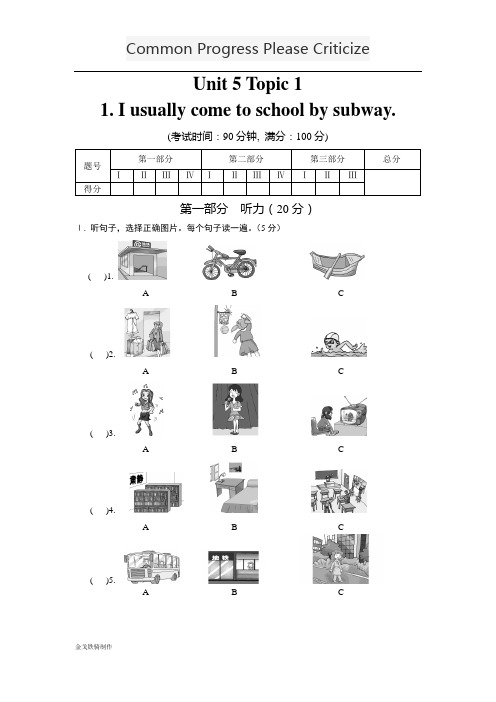
Unit 5 Topic 11. I usually come to school by subway.(考试时间:90分钟, 满分:100分)第一部分第二部分第三部分总分题号ⅠⅡⅢⅣⅠⅡⅢⅣⅠⅡⅢ得分第一部分听力(20分)Ⅰ. 听句子,选择正确图片。
每个句子读一遍。
(5分)( )1.A B C( )2.A B C( )3.A B C( )4.A B C( )5.A B CⅡ. 听句子,选择正确答语。
每个句子读一遍。
(5分)( )6. A. Oh, I’m not happy. B. The same to you. C. We are all happy.( )7. A. I have no free time. B. How about you?C. I often play basketball.( )8. A. No, I don’t. B. Yes, he does.C. No, I walk to school.( )9. A. Yes, it is. B. You’re right. C. Thank you.( )10. A. I like playing it very much. B. I want to play it very much.C. Three times a week.Ⅲ. 听对话,选择正确答案。
每段对话读两遍。
(5分)( )11. How does Michael usually come to school?A. By bus.B. By bike.C. On foot.( )12. What does the man often do on Sundays?A. He plays computer games.B. He plays basketball.C. He plays football.( )13. How often does Yu Ming go to the zoo?A. Every month.B. Every day.C. Every week.( )14. How does Miss Wang sometimes come to school?A. By bike.B. By bus.C. On foot.( )15. Where does Zhou Lina usually have lunch?A. In her office.B. At home.C. At school.Ⅳ.第二部分英语知识运用(55分)Ⅰ. 单项选择。
仁爱版Unit 5 Topic 1 Section C
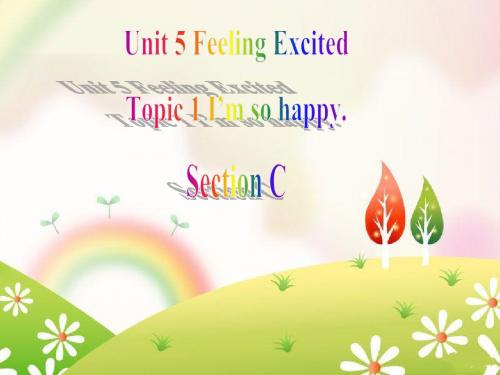
牛刀小试
_____ your help, we finished the task on time. A. Because B. Because of C. As D. For
2. Maria taught the children to sing lively songs and perform short, funny plays to cheer them up.玛利亚 教孩子们唱活泼欢快的歌曲以及表演有趣的短剧来使他 们高兴起来。
The End. Thanks!
牛刀小试
根据句意及首字母或汉语提示完成单词 onely If you have no friends, you may feel l_____. He is rich, but he is a lonely _____ (孤独的) man.
lonely和alone的区别
alone作形容词,意为“单独的,独自的”,没有感情色 彩,只是陈述一个客观事实,作表语。如: Jane was alone in that dark room. 简独自一人待在那个黑暗的屋子里。 alone作副词,意为“独自”,如: The old man lived alone. 这个老妇人独自一人生活。
lively, lonely, alone, almost, cheer…up, cheer…on, exciting
alone and he often feels very The old man lives ________ ________. lonely There’s going to be an ________ exciting basketball game between Class 3 and Class 5. Let’s go and cheer _____ _____ them on ____. Every time I’m upset and feel like giving up, my best friend Helen will encourage me and _____ cheer _____ me _______. up Ann is a ________ lively girl and she seems to be happy _________ almost all the time.
仁爱英语七年级下册Unit 5 Our school life Topic1 SectionC教案

Unit 5 Our School LifeTopic 1I usually come to school by subwaySection CPart 1:Teaching design (第一部分:教学设计)Structures: How questions; Affirmative and negative statementsTarget language:How do you get to school? I take the bus.Vocabulary: get to, how far, bicycle, subway, car, train, bus stop, train station, bus station, subway station, minute, kilometer, mile, transportation, calendarLearning strategies: Personalizing; I nferring vocabularySECTION CGoals●To learn to use How questions●Lean to talk about how to get to places,To talk about kinds of transportationProceduresWarming up by talkingHello, everyone! What’s the weather like today? It’s a sunny day with a gentlebreeze. It’s comfortable. So this morning I come to school by bike. It took menearly 50 minutes. What about you? Today, let’s talk about how you go fromone place to another. And we will talk about the time ittakes to get to places and how far it is between two places.1a. Looking and speaking.Look at the picture carefully and answer.Then please write how the students in the picture get to school in the morning in the chart.Sample answers:1. take the subway2. ride a bike3. take the bus4. take the train5. walk(on foot)6. take a boat7. take a taxi 8. go in a parent’s carAnswers:1. Bob takes the train.2. Mary takes the subway.3. John takes the bus.4. Paul walks.5. Yang Lan walks.TapescriptA: How do Bob and Mary get to school?B: Bob takes the train and Mary takes the subway.A: How does John get to school?B: He takes the bus.A: How do Paul and Yang Lan get to school?B: They walk. Look, there they are waling now!Now read the tapescript, shadow the how questions and underling the expressions.1b.Read and understand.Task 1.Fast readingwhat's the best title of the passage?A.How does Jane go to school?B.Jane's morningC.Jane's dayD.Jane's homeTask2.Careful reading.(1)When do the classes begin?(2)How many classes does she have in the morning?(3)Where does she have lunch?(4)When does she play soccer with her classmates?1C. Doing pairworkLook at the pictures. Can you name each form of transportation? They are easy to you. Read the time and distance that goes with each form of transportation. Pay attention to “mile”, which is a common measure of distance in some western countries. (1 mile=1.6 kilometers).Read the example dialogue in the box.Now make your own conversations using the information in the picture with your partner.A: How do you get to school?B: I take the train.A: How long does it take you to get from home toSchool ?B: It takes 35 minutes.A: How do you get to school?B: I walk.A: How long does it take you to get from home to school ?B: It takes 40 minutes.A: How do you get to school?B: I take the bus.A: How long does it take you to get from home to school?B: It takes 15 minutes.OK. Stop here please. Let’s ask some pairs to say their dialogues.1d. Talking and writingWell done everyone! Now let’s play a game: Info Gap Race! This time you work in groups of three. You decide which one is A, which one is B and which one is C. Please read the instruction. You ask each other questions to learn information for your chart, and then write the answers on the chart in your book. Don’t look at others’ pages please. The first group to fill in all the blanks is the champion.Sample dialogue:。
仁爱版英语八年级下册Unit5_Topic1基础练习题
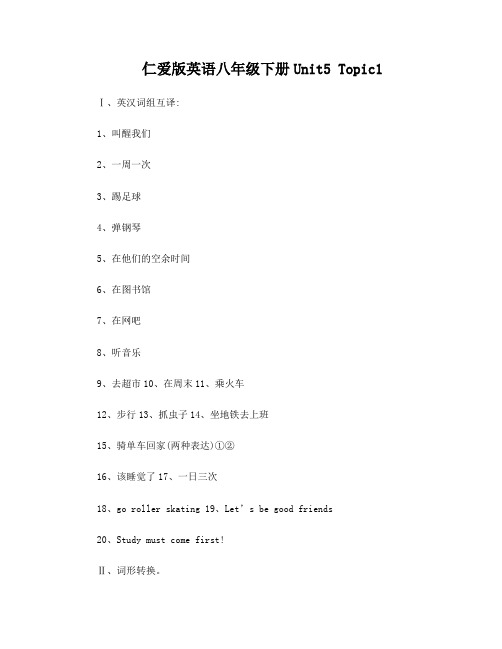
仁爱版英语八年级下册Unit5 Topic1 Ⅰ、英汉词组互译:1、叫醒我们2、一周一次3、踢足球4、弹钢琴5、在他们的空余时间6、在图书馆7、在网吧8、听音乐9、去超市10、在周末11、乘火车12、步行13、抓虫子14、坐地铁去上班15、骑单车回家(两种表达)①②16、该睡觉了17、一日三次18、go roller skating 19、Let’s be good friends20、Study must come first!Ⅱ、词形转换。
1、first(基数词)2、day(对应词)3、by sea(同义词组)4、by air(同义词组)5、late(反义词)___________6、life(复数)__________7、finish(第三人称单数)______ 8、spare(同义词)________9、story(复数)________ 10、piano(复数)_________11、finish(第三人称单数)______ 12、catch(第三人称单数)_______ 13、see(同音词)________ 14、bye(同音词)________15、around(同义词)______ 16、swim(现在分词)________17、come(现在分词)______ 18、new(反义词)__________19、feet(单数)___________ 20、often(同义词)_________Ⅲ、用所给词的适当形式填空。
1、It’s time ____ to bed. (go)2、They want _____ with you. (be)3、Ann _____ from America. (come)4、Tom _____ TV for a little while every day. (watch)5、Does your sister _____ homework in the evening? (do)6、I go to see the movie two _____ a month. (time)7、Today is the _____ day of the week. (one)8、Kate _____ to come here early. (have)9、We often go to the park by _____. (bus)10、Thank you for _____ help. (you)11、I usually go _____ in my spare time. (shop)12、My friends often _____ ball games after class. (play)13、Rose _____ in our school. (study)14、Mr. Green _____ them English. (teach)15、Kate _____ her homework carefully. (do)16、He often goes _____ on weekends. (dance)17、Maria _____to school every day. (ride)18、Please pass the book to ______. (he)19、We usually go school on _____. (foot).20、Miss Wu teaches ______ English. (we)Ⅳ、完成并翻译句子。
八年级英语下册 Unit 5 Topic 1 section C教案 仁爱版
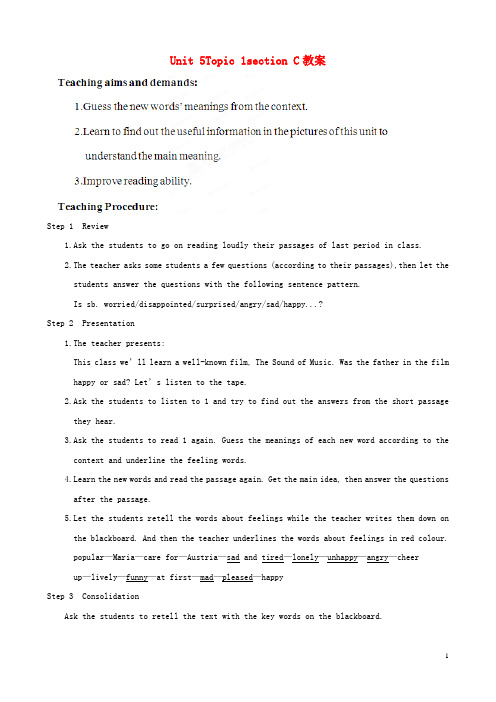
Unit 5Topic 1section C教案Step 1 Review1.Ask the students to go on reading loudly their passages of last period in class.2.The teacher asks some students a few questions (according to their passages),then let thestudents answer the questions with the following sentence pattern.Is sb. worried/disappointed/surprised/angry/sad/happy...?Step 2 Presentation1.The teacher presents:This class we’ll learn a well-known film, The Sound of Music. Was the father in the film happy or sad? Let’s listen to the ta pe.2.Ask the students to listen to 1 and try to find out the answers from the short passagethey hear.3.Ask the students to read 1 again. Guess the meanings of each new word according to thecontext and underline the feeling words.4.Learn the new words and read the passage again. Get the main idea, then answer the questionsafter the passage.5.Let the students retell the words about feelings while the teacher writes them down onthe blackboard. And then the teacher underlines the words about feelings in red colour.popular—Maria—care for—Austria—sad and tired—lonely—unhappy—angry—cheerup—lively—funny—at first—mad—pleased—happyStep 3 ConsolidationAsk the students to retell the text with the key words on the blackboard.Step 4 Practice1.Let the students learn all the words about feelings in 2 once more. Learn new words: nervous,Titanic, America, fall into (fell into), frightened, end, in the end, actor, actress2.Read and finish 2.Step 5 Project1.Talk about their favorite films with the words about feelings learned in groups of four.Finish 3.2.According to 2, write a brief introduction to his/her favorite film.。
Unit5_Topic1_SectionC教材知识详解

Topic1 SectionC教材知识详解1. She gets home at five thirty and has dinner at seven o’clock.她五点半到家,七点吃晚饭。
get home意为“到家”。
home是副词,get后接副词时不带to。
又如:get here/there 到这/那儿。
而“get to+地点名词”意为“到达某地”。
如:get to school 到校;get to the library 到图书馆。
2. — How often do you come to the library? 你多久来一次图书馆?— Three times a week. 一周三次。
how often意为“多长时间,多久一次”,对频度副词提问。
如:—How often do you go home, Judy? 朱迪,你多久回家一次?—Once a week. 一周一次。
how后通常跟一些形容词或副词构成疑问词,如:how old意为“几岁”,对年龄进行提问。
例:—How old are you? 你多大了?—I’m twelve. 我十二岁了。
3. Classes begin at eight. She has four classes in the morning.八点开始上课,她上午上四节课。
begin开始,着手;begin to do sth.或begin doing sth.开始做某事。
例:He usually begins to work at 7:30 a. m. every day.通常他每天早上七点半开始工作。
have classes 上课,又可以写作have a class例:We have an English class at 8:00 a. m. on Monday.我们周一早上八点上英语课。
4. After dinner, she often does her homework and then watches TV for a short time.晚饭后,她经常做作业,然后看一会儿电视。
仁爱版八年级英语下册Unit5 Topic1 SectionC 课后巩固训练

Unit5 Topic1 SectionC 课后巩固训练一、单项选择。
看谁选得又准又快。
1. The little boy plays ____ at home, but he doesn’t feel ____.A. alone; aloneB. alone; lonelyC. lonely; lonelyD. lonely; alone2. We can’t go out ____ the heavy rain.A. insteadB. becauseC. instead ofD. because of3. At first, the boy felt interested to listen to the funny story. But later, he ____ bored because of the same story.A. sound edB. becameC. seemsD. looks4. The news ____ them ____. They all jumped up and down happily.A. made; excitedB. makes; happyC. made; surpriseD. makes; to excite5. —____.—It is very exciting.A. How do you know about the movie?B. What do you think of the movie?C. What’s the movie about?D. What happens in the movie?二、完形填空。
Iron Man (钢铁侠)is one of the most popular movies among the young people. It is 1 American boy named Tonny Stark. Stark’s father had a very big 2 . His family was very rich, 3 little Tonny still studied hard, unlike other rich kids. He was very clever. When he was 4 , he went to a famous university (大学). Two years 5 , he got a good resultand left the university as a good student. But unluckily, his parents died in a plane 6 . He had to be the boss of his father’s factory.Tonny’s cleverness (聪明) and knowledge brought his company more money. But his success (成功) took him in 7 . He 8 when he was fighting with the enemy (敌人). A piece of iron was in his body. 9 the help of a great scientist, he was saved, and became Iron Man. Then he began to use his invention to keep on 10 with the bad men. Finally, he won and became a hero.1. A. about B. for C. since D. from2. A. family B. factory C. book D. house3. A. so B. for C. but D. and4. A. 15-year-old B. 15 year old C. 15-years-ol d D. 15 years old5. A. ago B. later C. after D. before6. A. travel B. trip C. accid ent D. time7. A. wrong B. dangerous C. danger D. company8. A. became angry B. worked hard C. fell excited D. got hurt9. A. With B. Und er C. On D. In10. A. studying B. working C. making D. fighting三、阅读理解。
仁爱版九年级英语下册第五单元topic1sectionc教案

Unit5 Topic1 SectionC 教学设计Ⅰ. Material analysis本课是九年级第五单元第一个话题的第三课时,主活动为1a和3。
通过短文The Great Wall 的学习,见识了世界上最伟大的奇迹之一长城的瑰丽风采;进一步运用定语从句来描述名胜古迹,以更好地掌握定语从句的用法;提高学生在阅读中根据句子的含义辨认单词,猜测陌生词语的技能及信息转换的技能,并通过第二部分和第三部分任务的设置来完成“读-说-写”的任务链,实现真正意义上的拓展,达到学以致用的目的,提高学生自主、合作、探究的能力。
通过本课的学习,学生在了解到长城的地理知识和悠久的历史,开拓视野增长见识的同时,也能激发他们的民族自豪感并加深他们对祖国油然而生的热爱之情。
Ⅱ.Teaching aims1. Knowledge aims:1) Words and phrases:state, remain, separate, enemy, expect, treasure, suppose, stretch from…to …, bring…into…, be regarded as…, be famous for12) Grammar:进一步掌握that /which 引导的定语从句的用法。
2. Skill aims:1)能读懂介绍长城相关知识的短文,在阅读中能根据语境推测、理解生词的含义。
2)能理解短文大意,并将文本信息转换为图表信息。
3)学以致用,把输入的信息“如何介绍一处名胜”通过说和写的方式输出。
3.Emotional aims:1)遇到问题时能主动请教,勇于克服困难。
2)开拓视野增长见识,对祖国的文化能有更深刻的了解,激发民族自豪感和对祖国大好河山的热爱之情。
4.Culture awareness:了解长城的地理知识和悠久的历史。
5.Learning strategies:拆分理解定语从句。
2Ⅲ. The key points and difficult points1. Words and phrases:state, remain, separate, enemy, expect, treasure, suppose, stretch from…to …, bring…into…, be regarded as…, be famous for2. Sentences:1) The entire wall, which has many branches, is about 8 800 kilometers long.2) It stretches from Shanhaiguan in the east to Jiayuguan in the west.3) It is said that he who has never been to the Great Wall is not a true man.3. Grammar:Attributive clauses (which/that)Ⅳ. Teaching aids多媒体课件,或黄山、长城、黄果树瀑布、西湖、故宫和华表的图片;关于长城的短片。
Unit 5 Topic 1 Section C(课件)八年级英语下册课件(仁爱版)
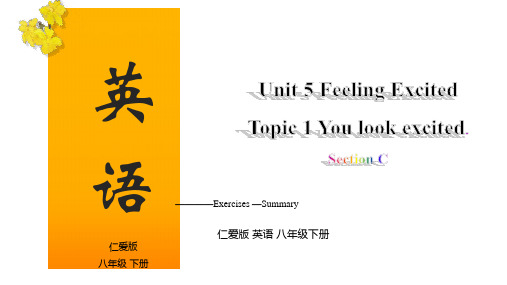
2. Why were the Von Trapp family sad?
Because Mrs Von Trapp died.
3. How did Maria cheer up the children?
She taught the children to sing lively songs and perform sh4o. rWt,hfautndnoyypoluaythsintok ocfhMeearritah?em up.
(邀请) me to Beijing for a visit.4.If you have no friends, you may
feel l .5.inHveitaenswered a all of my questions.
onely
lmost
1 a Read and understand
1. Look at the picture and guess what the text is about.
3
songs and short, __________ pfluaynsn.yThe father
felt _______ amt afidrst, but then he became
happy
_________ again when he saw their smiling
____________ faces.
The Sound of Music is one of the most popular American movies. It's a story about a young woman living in Austria. Her name was Maria. She went to the Von Trapp family to care for seven children.
仁爱版英语八年级下册Unit5 Topic1 SectionC教材知识详解
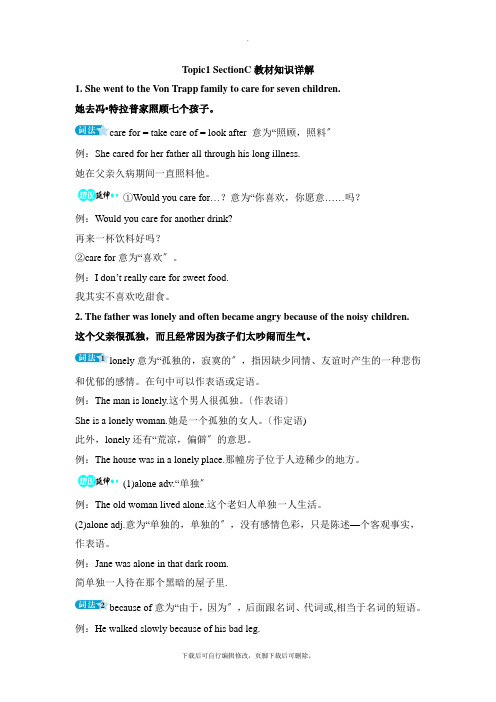
Topic1 SectionC教材知识详解1. She went to the Von Trapp family to care for seven children.她去冯•特拉普家照顾七个孩子。
care for = take care of = look after 意为“照顾,照料〞例:She cared for her father all through his long illness.她在父亲久病期间一直照料他。
①Would you care for…?意为“你喜欢,你愿意……吗?例:Would you care for another drink?再来一杯饮料好吗?②care for意为“喜欢〞。
例:I don’t really care for sweet food.我其实不喜欢吃甜食。
2. The father was lonely and often became angry because of the noisy children.这个父亲很孤独,而且经常因为孩子们太吵闹而生气。
lonely意为“孤独的,寂寞的〞,指因缺少同情、友谊时产生的一种悲伤和优郁的感情。
在句中可以作表语或定语。
例:The man is lonely.这个男人很孤独。
〔作表语〕She is a lonely woman.她是一个孤独的女人。
〔作定语)此外,lonely还有“荒凉,偏僻〞的意思。
例:The house was in a lonely place.那幢房子位于人迹稀少的地方。
(1)alone adv.“单独〞例:The old woman lived alone.这个老妇人单独一人生活。
(2)alone adj.意为“单独的,单独的〞,没有感情色彩,只是陈述—个客观事实,作表语。
例:Jane was alone in that dark room.简单独一人待在那个黑暗的屋子里.because of意为“由于,因为〞,后面跟名词、代词或,相当于名词的短语。
仁爱版英语七年级下册 Unit 5 Topic1 Sectin C 课后练习
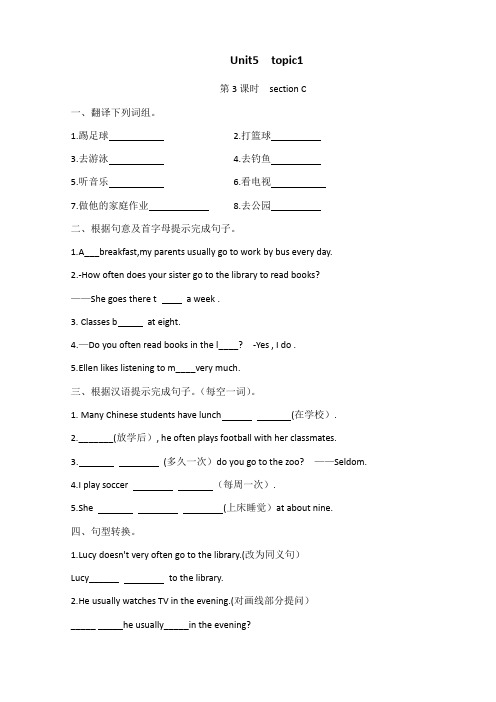
Unit5 topic1第3课时section C一、翻译下列词组。
1.踢足球2.打篮球3.去游泳4.去钓鱼5.听音乐6.看电视7.做他的家庭作业8.去公园二、根据句意及首字母提示完成句子。
1.A___breakfast,my parents usually go to work by bus every day.2.-How often does your sister go to the library to read books?——She goes there t a week .3. Classes b at eight.4.—Do you often read books in the l____? -Yes , I do .5.Ellen likes listening to m____very much.三、根据汉语提示完成句子。
(每空一词)。
1. Many Chinese students have lunch (在学校).2._______(放学后), he often plays football with her classmates.3. (多久一次)do you go to the zoo? ——Seldom.4.I play soccer (每周一次).5.She (上床睡觉)at about nine.四、句型转换。
1.Lucy doesn't very often go to the library.(改为同义句)Lucy______ to the library.2.He usually watches TV in the evening.(对画线部分提问)_____ _____he usually_____in the evening?3. The classes finish at about four o'clock in the afternoon.(对画线部分提问)_____ _____ _____ the classes finish in the afternoon?4.Wang Fang often goes to school by bike.(对画线部分提问)_____ _____ Wang Fang often go to school?5.They usually have supper at home.(对画线部分提问)_____ _____they usually have supper?五、单项选择。
仁爱版八年级英语下册Unit 5 Topic 1课堂检测题
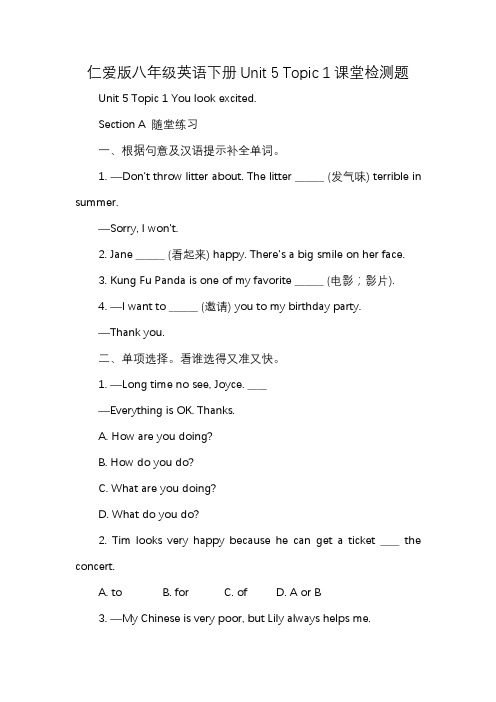
仁爱版八年级英语下册Unit 5 Topic 1课堂检测题Unit 5 Topic 1 You look excited.Section A 随堂练习一、根据句意及汉语提示补全单词。
1. —Don’t throw litter about. The litter ______ (发气味) terrible in summer.—Sorry, I won’t.2. Jane ______ (看起来) happy. There’s a big smile on her face.3. Kung Fu Panda is one of my favorite ______ (电影;影片).4. —I want to ______ (邀请) you to my birthday party.—Thank you.二、单项选择。
看谁选得又准又快。
1. —Long time no see, Joyce. ____—Everything is OK. Thanks.A. How are you doing?B. How do you do?C. What are you doing?D. What do you do?2. Tim looks very happy because he can get a ticket ____ the concert.A. toB. forC. ofD. A or B3. —My Chinese is very poor, but Lily always helps me.—You should ____ her.A. be popular withB. say thanks toC. be angry withD. listen to4. The news ____ interesting. Please tell me more.A. feelsB. listensC. hearsD. sounds5. —Would you like to invite Mr. Wang ____ sports with you? —Yes, I’d love to.A. to playB. to lookC. playingD. looking三、根据汉语意思完成下列句子。
仁爱版英语七年级下册Unit-5-Topic-1-Section-C名师公开课获奖课件百校联赛一等奖
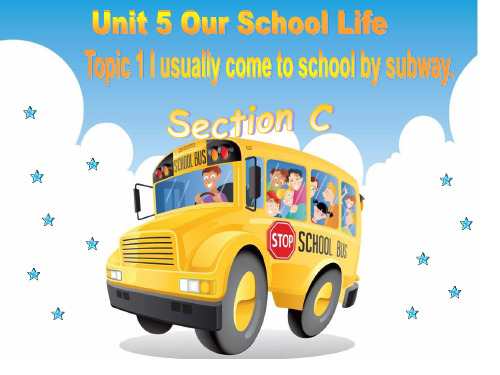
Classes begin at eight.
(2)How many classes does she have in the morning?
She has four classes in the morning.
(3)Where does she have lunch?
She has lunch at school.
… is my friend/classmate. He/She usually gets up at … in the morning …
打篮球 play basketball
踢足球 play soccer/football play+球类运动(不加冠词) play with sb/sth.同某人玩/ 把玩某物 同我旳同班同学玩
Wen Wei go swimming go fishing
A:_W_h_a_t_d_o_e_s__W__e_n_W__e_i _u_s_u_a_lly__d_o_a_f_te_r_s_c_h_o_o_l_?______ B:_H_e__u_s_u_a_lly__g_o_e_s__s_w_im__m__in_g_,_b_u_t_h_e__d_o_e_s_n_’t_g_o__fi_s_h_i_n_g.
Wang Junfeng do his homework go to the park
A:_W__h_a_t _d_o_e_s_W__a_n_g_J_u_n_f_e_n_g_u_s_u_a_ll_y_d_o__a_ft_e_r _s_c_h_o_o_l?__
B:_H_e__u_s_u_a_lly__d_o_e_s__h_is__h_o_m_e_w__o_r_k_, _b_u_t _h_e_d_o_e_s_n_’t____ _g_o__to__th__e_p_a_r_k_.
七年级英语仁爱版下册Unit 5 topic 1---3 同步测试题附答案不全
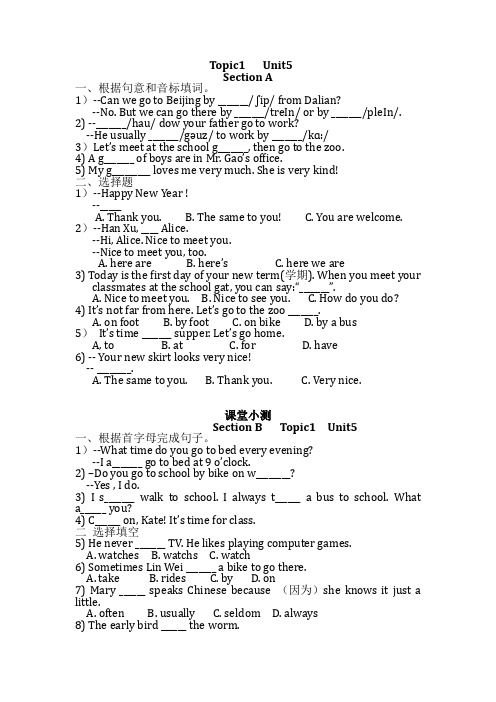
Topic1 Unit5Section A一、根据句意和音标填词。
1)--Can we go to Beijing by _______/ ʃip/ from Dalian?--No. But we can go there by _______/treIn/ or by _______/pleIn/. 2) --_______/hau/ dow your father go to work?--He usually _______/gәuz/ to work by _______/kɑ:/3)Let’s meet at the school g_______, then go to the zoo.4) A g_______ of boys are in Mr. Gao’s office.5) My g_________ loves me very much. She is very kind!二、选择题1)--Happy New Year !--_____A. Thank you.B. The same to you!C. You are welcome. 2)--Han Xu, ____ Alice.--Hi, Alice. Nice to meet you.--Nice to meet you, too.A. here areB. here’sC. here we are3) Today is the first day of your new term(学期). When you meet yourclassmates at the school gat, you can say:“_______”.A. Nice to meet you.B. Nice to see you.C. How do you do?4) It’s not far from here. Let’s go to the zoo _______.A. on footB. by footC. on bikeD. by a bus5)It’s time _______ supper. Let’s go home.A, to B. at C. for D. have6) -- Your new skirt looks very nice!-- ________.A. The same to you.B. Thank you.C. Very nice.课堂小测Section B Topic1 Unit5一、根据首字母完成句子。
Unit5 Topic1 习题
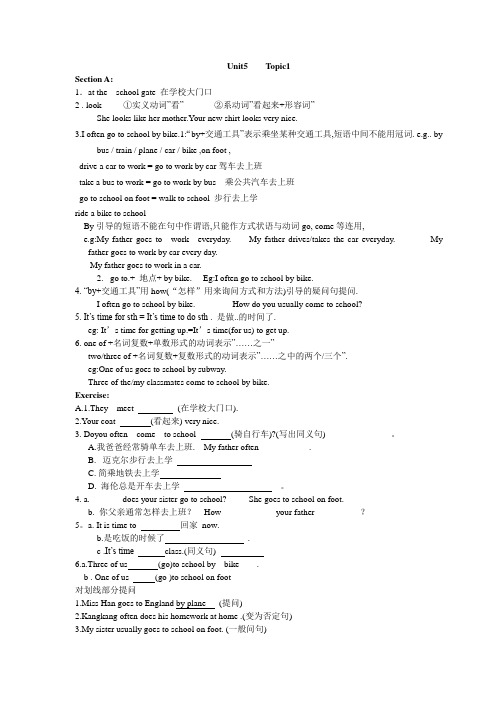
Unit5 Topic1Section A:1.at the school gate 在学校大门口2 . look ①实义动词‖看‖②系动词‖看起来+形容词‖She looks like her mother.Your new shirt looks very nice.3.I often go to school by bike.1:“by+交通工具‖表示乘坐某种交通工具,短语中间不能用冠词. e.g.. bybus / train / plane / car / bike ,on foot ,drive a car to work = go to work by car 驾车去上班take a bus to work = go to work by bus 乘公共汽车去上班go to school on foot = walk to school 步行去上学ride a bike to schoolBy引导的短语不能在句中作谓语,只能作方式状语与动词go, come等连用,e.g:My father goes to work everyday. My father drives/takes the car everyday. Myfather goes to work by car every day.My father goes to work in a car.2. go to.+ 地点+ by bike. Eg:I often go to school by bike.4. ―by+交通工具‖用how(“怎样”用来询问方式和方法)引导的疑问句提问.I often go to school by bike. ______ How do you usually come to school?5. It’s time for sth = It’s time to do sth . 是做..的时间了.eg: It’s time for getting up.=It’s time(for us) to get up.6. one of +名词复数+单数形式的动词表示‖……之一‖two/three of +名词复数+复数形式的动词表示‖……之中的两个/三个‖.eg:One of us goes to school by subway.Three of the/my classmates come to school by bike.Exercise:A.1.They meet (在学校大门口).2.Your coat (看起来) very nice.3. Doyou often come to school (骑自行车)?(写出同义句) 。
仁爱英语七年级下Unit5Topic1练习题

仁爱英语七年级下Unit5Topic1练习题Unit5Topic1SectionA练习题一、单项选择1.Let’smeet____theschoolonfoot.A. inB.toC.atD.for2.It’stime____gotobed.A. oftenB.forC.onD.to3.AllengetstoNewYork___.A.bytheplaneB.onplaneC.byplaneD.inplane4.It’stime____supper.A.atB.forC.toD.on5.—_____youoftencometoschoolonyourbike? —______Yes,I_____.A. Do,doB.Are,areC.Does,doesD.Is,is6.—Howdoyouusuallycometoschool? —Iusuallycometoschool____foot.A. InB.byC.withD.on7.Shelooks_____.Askhertohelpyou.A.oldB.sorryC.wellD.kind8.—____doyouusuallygotoschool? —Bybike.A.WhatB.WhenC.HowD.Which9.—HappyNewYear!—________!A.ThankyouB.NotatallC.ThesametoyouD.Youarewelcome10.Myboolisinteresting._____yours?A.WhatisB.WhoseisC.HowaboutD.Whatislike二、句型转换1.Tomusuallydrivestowork.(变同义句)Tomusually_____ ___________ ____________.2.我们中有五人骑自行车上学。
(完成译句)Five____usgotoschool_____ _____.3.Theboyusuallygoestoschoolbybike.(对划线部分提问)___________theboyusuallygotoschool? 4.Icometoschoolinmymother’scartoday.(对划线部分提问)__________youcometoschooltoday?5.Mr.Leegoestoworkbybus.(变为一般疑问句并作肯定回答)_____Mr.Lee____toworkbybus?Yes,___________.6.该睡觉了。
七年级英语Unit5 Topic 1 Section C
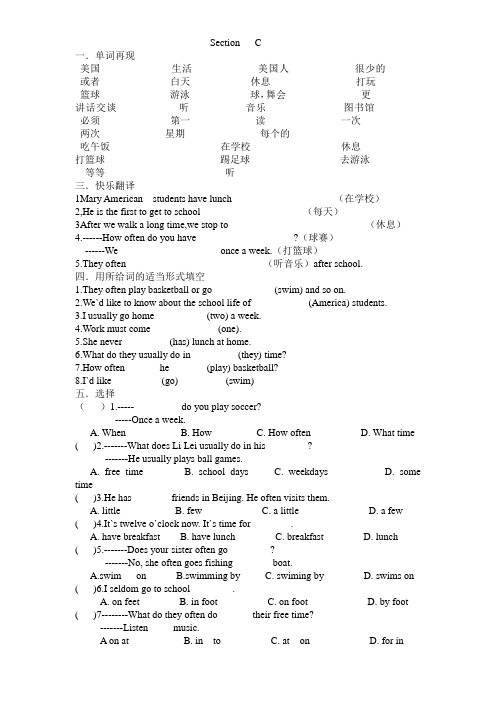
Section C一.单词再现美国____________ 生活___________ 美国人____________ 很少的_______ 或者____________ 白天__________ 休息___________ 打玩________ 篮球____________ 游泳_________ 球,舞会__________ 更_______ 讲话交谈________ 听_________ 音乐___________ 图书馆_______ 必须________ 第一_________ 读___________ 一次________ 两次_________ 星期_________ 每个的_________吃午饭__________________ 在学校_____________ 休息___________ 打篮球________________ 踢足球____________ 去游泳__________ 等等__________________ 听______________三.快乐翻译1Mary American students have lunch ________ __________(在学校)2,He is the first to get to school _________ _________(每天)3After we walk a long time,we stop to ________ _______ ________(休息)4.------How often do you have ________ _________?(球赛)------We ________ ________ once a week.(打篮球)5.They often ________ _______ _______ (听音乐)after school.四.用所给词的适当形式填空1.They often play basketball or go ____________(swim) and so on.2.We`d like to know about the school life of ___________(America) students.3.I usually go home __________(two) a week.4.Work must come _____________(one).5.She never _________(has) lunch at home.6.What do they usually do in _________(they) time?7.How often ______ he _______(play) basketball?8.I`d like__________(go) _________(swim)五.选择()1.-----_________ do you play soccer?-----Once a week.A. WhenB. HowC. How oftenD. What time ( )2.-------What does Li Lei usually do in his ________?-------He usually plays ball games.A. free timeB. school daysC. weekdaysD. some time( )3.He has _______ friends in Beijing. He often visits them.A. littleB. fewC. a littleD. a few ( )4.It`s twelve o`clock now. It`s time for________.A. have breakfastB. have lunchC. breakfastD. lunch ( )5.-------Does your sister often go ________?-------No, she often goes fishing _______ boat.A.swim onB.swimming byC. swiming byD. swims on ( )6.I seldom go to school ________.A. on feetB. in footC. on footD. by foot ( )7--------What do they often do ______ their free time?-------Listen ____ music.A on at B. in to C. at on D. for in。
Unit 5 Topic 1 教学内容整合仁爱七年级英语下册
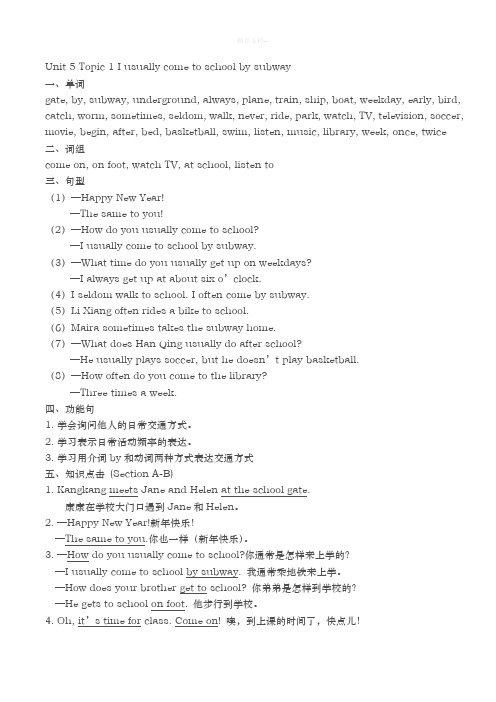
Unit 5 Topic 1 I usually come to school by subway一、单词gate, by, subway, underground, always, plane, train, ship, boat, weekday, early, bird, catch, worm, sometimes, seldom, walk, never, ride, park, watch, TV, television, soccer, movie, begin, after, bed, basketball, swim, listen, music, library, week, once, twice 二、词组come on, on foot, watch TV, at school, listen to三、句型(1)—Happy New Year!—The same to you!(2)—How do you usually come to school?—I usually come to school by subway.(3)—What time do you usually get up on weekdays?—I always get up at about six o’clock.(4)I seldom walk to school. I often come by subway.(5)Li Xiang often rides a bike to school.(6)Maira sometimes takes the subway home.(7)—What does Han Qing usually do after school?—He usually plays soccer, but he doesn’t play basketball.(8)—How often do you come to the library?—Three times a week.四、功能句1.学会询问他人的日常交通方式。
- 1、下载文档前请自行甄别文档内容的完整性,平台不提供额外的编辑、内容补充、找答案等附加服务。
- 2、"仅部分预览"的文档,不可在线预览部分如存在完整性等问题,可反馈申请退款(可完整预览的文档不适用该条件!)。
- 3、如文档侵犯您的权益,请联系客服反馈,我们会尽快为您处理(人工客服工作时间:9:00-18:30)。
Unit5 T opic1 Section C自学指导与课堂作业
学习目标:1、继续学习用that 和which 引导的定语从句。
2、提高学生的阅读和写作能力。
一、P5-6单词学习
motherland /’mʌðəlænd/ n. 祖国connect…with…与……连接
be known as 作为……而著称gambling /gæmblɪŋ/ house 赌场
island /’ailənd / n. 岛,岛屿various /’veriəs / 各种各样的,不同的unique / j u’ni:k/ adj. 独特的,罕见的,独一无二的
enemy /’enəmi/ n. 敌人,反对者flat /flæt/ adj. 平的n.公寓,一套房间roof /ru:f/ n.屋顶,顶部cave /keɪv/ n. 洞,穴
二、1a自学指导:精读课文1a,完成下面的分析与练习。
1.There are three beautiful places which attract a great number of visitors to China every year.
有三个美丽的地方,每年吸引大量的游客来中国。
◆在此句中,定语从句是____________________________________;先行词是____________,
关系代词是____________,它指________(人或物),在句中做_________
◆许多,大量_____________________________________
2.It serves as a bridge which connects the mainland with the rest of the world.它是连接祖国大陆与世界其他地方的桥梁。
◆在此句中,定语从句是____________________________________;先行词是____________,
关系代词是____________,它指________(人或物),在句中做_________
◆与……连接:_____________________还可写为:___________________________
3. It is known as the pearl of the Orient and Shopping Heaven. 香港作为“东方之珠”和“购物天堂”而闻名于世。
◆作为……. 而闻名__________________,同义词组:______________________,它们后常
跟____________之类的名词或名词短语,主语通常是人名或地名。
◆因……. 而闻名_____________________
4. If you have a chance to go there, 如果你有机会去那儿,
◆有机会去做某事:_____________________________
5. People regard Macao as Gambling City.人们把澳门称作“赌城”。
◆把……看作……:认为……是……_________________,被动结构写为:________________ ◆同义词组:
●①treat…as…,被动结构写为:_____________________;
②consider…as…,被动结构写为:_____________________;
6. In Macao, you can also go on a visit to Mazu Temple and Ruins of St. Paul.在澳门,你也可以游览妈祖庙和圣保罗大教堂遗址。
be on a visit to…去……参观,相当于动词visit
7. Taiwan is considered the Treasure Island of China.台湾被认为是中国的宝岛。
be considered (as) 意为“被认为是……,被当作……”后面可接名词或名词短语,其中as 可省略。
如:
Mr Wang is considered (as) an excellent teacher. 王老师被认为是一位优秀的老师。
课堂练习:
( ) 1. ——It’s said that a new railway will be built to connect Beijing ___ Guangdong .
——Good news !
A. at
B. in
C. for
D. with
( ) 2. Ba Jin, one of the greatest writers in China , ___as “ People’s writer” .
A. is regarded
B. has regarded
C. is regarding
D. regards
( ) 3. ——I have told you everything _____ I know . ——Thanks a lot .
A. which
B. \
C. what
D. and
( ) 4. ——Have you been to West Lake ?
——Y es . It’s the most beautiful place ___ I have been to .
A .that B. which C. what D. where
( )5.Xishuangbanna which ______ its beautiful scenery makes me really excited.
A. is known as
B. regards as
C. is famous for
D. considers as ( )6.—Have you read the poems ______ by Du Fu?
—Of course, many of them.
A. wrote
B. writing
C. named
D. written
( )7.Taiwan is ______ ______ the Treasure Island of China and it is a part of China.
A. regard as
B. regarded as
C. regard to
D. regarded to
( )8.The number of people invited ______ fifty, but a number of them ______ absent(缺席) for different reasons.
A. were; was
B. was; was
C. was; were
D. were; were
世界上有两种人:空想家和行动家,空想家们谈论、想象、渴望、设想做大事情;而行动家则是去做。
当梦想和现实面对时,总是很痛苦的。
要么你被痛苦击倒,要么你把痛苦踩在脚下。
